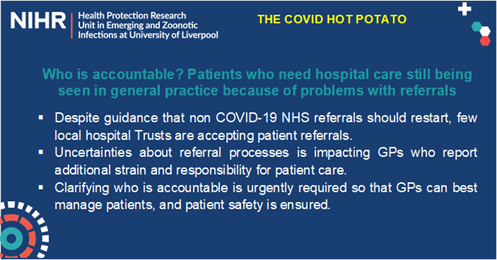The COVID Hot Potato 5
Thu, 21 May 2020

This week: General practitioners (GPs) describe the challenge of managing patient referrals to hospital services after the initial suspension of non-urgent and routine referrals during the peak of COVID-19. Despite NHS England guidance advising that referrals should resume, ongoing difficulties and inability to refer patients has produced extra work, and challenges in identifying who is responsible for patients’ care.
At the end of April 2020, NHS England wrote to Trust Chief Executives setting out actions for the second phase of the COVID-19 response, including that GPs make two-week wait cancer, urgent, and routine referrals to hospital-based specialists as normal.[i]On the 4th of May 2020, NHS Digital produced guidance on managing referrals, and advised that referral systems should return to pre-pandemic levels with transfer of clinical responsibility from community practitioners to hospital Trusts at the point of referral.[ii]
In our interviews this week, it was clear that this guidance still had not been taken up across all local Trusts. A Clinical Director in a Liverpool hospital clarified that: “The electronic referral system is closed down, so you can’t do it online, but we will see emergency referrals.”
Whilst two-week wait and other ‘urgent’ referrals are still being accepted by local hospitals, as GPs point out, there is no clear guidance on what counts as ‘urgent’: “The issue is: what counts as urgent? We can’t only be looking for cancers…other things kill you as well.” The Clinical Director in Liverpool reflects on how urgency is based on judgement, rather than guidance: “You do make that call on the information you’re given, which is usually minimal, of ‘urgent, non-urgent, or routine’. But it’s an interesting question to ask, because there isn’t real guidance about that...it goes with experience.”
One GP, who felt that workloads had increased unnecessarily for GP practices, had experienced “a lot of issues with hospitals bouncing back referrals…To give an example, any investigation that had been requested – so any ultrasounds or scans that had been requested by us, some of them from January…one of the radiologists [in the local hospital] ostensibly reviewed all of the forms and sent them all back to us, saying: ‘Is this still required?’”
A GP partner in Knowsley explained that hospital-based care services not accepting referrals is a problem because: “until a patient sees a consultant, the GP holds the medico-legal responsibility of that referral…so all of a sudden we’re holding this responsibility and can’t execute it because we’re not specialists, first of all, and we don’t have access to the tests that they have.” His account highlights that there needs to be a clear and systematic way to move these referrals on and agreement on how long patients can wait to be seen by a specialist, “otherwise we [GPs] will keep holding onto this clinical responsibility that we can’t manage.”
Despite guidance from the NHS clarifying that once a patient is referred this clinical responsibility is held by the hospital, GPs feel that the current uncertainty of referral systems means they cannot rely on this to make sure their patients are seen and maintain patient safety.“You can turn around and say, ‘here’s my proof that I sent it to you’ – but actually, does that matter if something happens to the patient? Does the fact that you’ve got proof that you sent it actually make any difference, conscientiously, if the patient is actually not looked after? And the answer is no.”
NOTE: The NIHR Health Protection Research Unit in Emerging and Zoonotic Infections brings together internationally leading researchers from the University of Liverpool, University of Oxford, Liverpool School of Tropical Medicine, and Public Health England.
We are conducting an MRC-Funded project to understand the dynamics of policy development and healthcare professionals’ behaviour in the UK during the COVID-19 pandemic. We have a targeted panel of healthcare professionals, with whom we regularly speak, to capture their experiences and reactions over the course of the outbreak. They include clinical leads, junior doctors, and nurses in HCID units, Emergency departments, intensive therapy units, medical wards, neonatal units and GP surgeries.
We have previously identified emerging issues around PPE challenges, the need for testing of healthcare professionals, and the need for mental health support for staff on the frontline, all of which were fed back to Government Advisory Panels, and proved to be important in decision-making.
If you’d like to contact the HPRU EZI, you can email hpruei@liverpool.ac.uk or call 0151 795 9626.
